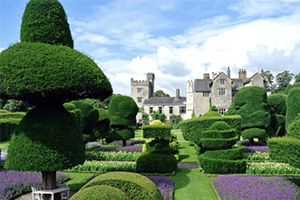Mental health was a worry in the UK even pre-pandemic, but it is of even greater concern now. For those lucky enough to live close to the southern Lake District, however, there is a unique place to be, which could offer the mindfulness benefits which many of us require.
The owner of Levens Hall’s Gardens, close to Kendal, has found that the topiary garden – a world record-holder by virtue of being the oldest on the planet and with roots going back to 1694 – has become an even greater place of contemplation, reflection and focus since it was able to reopen its gates than it was previously. The gardens are providing a new benefit to visitors – the restoration of mental health, spiritual uplift and a huge amount of refocus.
The fabulous topiary garden – just one part of Levens Hall’s Gardens - boasts over 100 pieces of topiary, of all shapes and sizes and artistic forms, from geometric shapes, such as ball and pyramids, to specific ‘characters’, be that a toppling wedding cake, an umbrella, a top hat, a judge’s wig or Queen Elizabeth I.
The garden is, therefore, full of trees which the eyes can focus on and consider, whilst sitting on a bench, in a tranquil place where mindfulness comes easy, amidst birdsong and fresh Cumbrian air. With no limit on how long you can dwell in this area, it is a haven for those who need to restore their mental health, by travelling to a ‘different place’, with the help of trees that can literally take the mind elsewhere.

This aspect to the garden’s appeal has not changed, probably over the three centuries and more that it has existed. The topiary garden has long been a part of the gardens in which some would linger and enjoy the artistry surrounding the trees in front of them. What has altered is our understanding of mental health and why Levens Hall’s Gardens’ topiary garden may have so much to offer to those with a need to restore their mind’s functionality and balance.
Over and above the fact that the gardens have shapes and pieces that are ideal focal points for those practising mindfulness, Levens Hall’s Gardens has found that its topiary trees may also have similar facets to elements of architecture that have been shown to assist stress levels, by offering our brains the patterns or rhythms that our brains have associated with safety, security, well-being and survival, throughout human evolution.
Being able to compare and contrast shapes and sizes, repeated and alternating patterns within the topiary, and the increasing and decreasing sizes of elements, such as topiary balls and levels of topiary within a design such as the Top Hat or Wedding Cake, are all mentally beneficial.
The ‘tree line’ within the topiary garden also enables us to exercise ‘transition’ – the use of a line that the eye is able to continuously follow, from one point to the next. This may have the same benefits that can be derived by using natural elements within architecture and transitioning from one part of a building to another, drinking in aesthetic beauty.
Having the ability to do all these things is a means of helping to release oxytocin, endorphins and DHEA, which all result in a sense a pleasure and a restoration of our body and its immune system. This is beneficial for both mental and physical health.
All of this theory, builds on the proven health benefits of biophilia – a term first used by Eric Fromm to describe humans’ innate affinity with the natural world. When we are deeply connected to nature, studies show that we experience lower cortisol levels, blood pressure and pulse rate. Biophilic experiences can also increase creativity and focus, enhance sleep, reduce depression and lower our levels of anxiety and provide faster post-surgical recovery.
Immersion in the topiary at Levens Hall, during a deep-dive visit and time spent in the garden, is most likely, therefore, to have huge benefits for those requiring some level of post-pandemic body and soul restoration and an opportunity to recharge mentally and physically.
Making sense of the shapes in front of them, could help those in greatest need of mental health support make sense of the world. Form, complexity, stimulation and mystery are all elements provided from hours spent viewing the magnificent topiary and all can be hugely beneficial to those willing to fully ‘drink’ the scene in, achieving focus and helping nature work in synergy with their being.
Levens Hall’s owner, Richard Bagot, says: “We believe that our gardens are providing a degree of mental health restoration, solace and focus beyond anything we have seen before. We understand the need for some of our visitors to just be alone and enjoy the benefits of our unique space. For some, it is about stress relief after the pandemic and for others it may be about recharging and gaining the strength to move on. If our garden can provide the means to do that, it is very special.”
Entrance to the Levens Garden at Levens Hall costs £10.50 for an adult, £4 for a child or £26 for a family. The gardens open at 10am and close at 5pm, with last entry at 4pm, and visits to the Topiary Garden are available Sunday to Thursday (closed Fridays and Saturdays) until October 7, 2021, when the gardens close for their winter break and the mammoth six-month-long task of clipping the topiary begins.
With a few months yet, in which to enjoy the benefits of form, structure, transition and biophilia, there is every opportunity to enjoy Levens Hall’s Gardens for different reasons than just an appreciation of topiary as an art form, or of the gardens as superbly maintained horticultural space. If you wish to make sense of the world around you, perhaps Levens Hall’s Gardens is the place to be.


